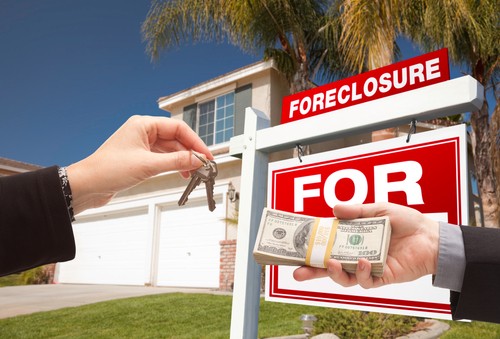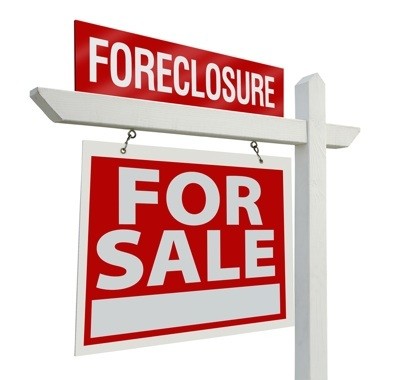Buying a Home in Foreclosure What You Need to Know
Post on: 16 Март, 2015 No Comment

Hard Times, Hard Choices
By Fred Yager
After years of steadily rising, home prices are starting to come down nationwide, while the foreclosure rate is rising dramatically. Meanwhile, over a million foreclosures are expected to be recorded this year.
That means a would-be homeowner could potentially save even more money by buying a home that’s been taken over by a bank or lender seeking to recover money still owed on the property.
According to realtytrac.com. a real estate website that tracks trends including foreclosures, as recently as last year the national average when buying a foreclosure home was about 25 percent below the full market value of a home.
But that average may not be quite as eye-popping this year since many of the new foreclosures stem from problems in the subprime mortgage market. Many people are losing their homes after being hit with a huge jump in monthly payments once initial low interest rates adjusted up, sometimes to double digits.
Many of these foreclosures are new homeowners who had built little or no equity in their property; therefore, the amount the lender is trying to recover may be close to the full market value of the house or at most only a 10 percent discount.
Zalman Velvel, of Fort Myers, Florida, a Certified Commercial Investment member (CCIM), trainer, auctioneer and author who has been buying and selling foreclosure properties for over 20 years cautions novices to the foreclosure market to be aware of all the land mines involved.
If you’re a homeowner in trouble, this article isn’t for you. A few weeks ago, we wrote about what you can do to avoid foreclosure. We have nothing but sympathy for homeowners in trouble and nothing we say is intended to victimize them or worsen their situation.
However, let’s be realistic. In any kind of market, there are buyers and sellers. If you’ve been priced out of homeownership the last several years, this may be your chance to get a home of your own. You shouldn’t feel guilty about buying a home that’s been foreclosed — you didn’t make it happen and if you don’t buy the home, someone else will.
Having said that, let’s get back to the nuts and bolts of buying a foreclosed home.
Land Mines
You have to know how to do a title search, says Velvel, or you could end up thinking you’ve just bought a home by paying off a $100,000 mortgage only to find out that was just the second mortgage and you have to pay another $200,000 to take ownership.
Suddenly that great buy isn’t such a good deal. You also have to be aware of [any] liens on the property because you’re going to be responsible for those as well.
On top of that foreclosure homes are sold as is which means that the 25 percent you just saved on the purchase price can easily be eaten up by unforeseen expenses such as repairs not immediately apparent in an exterior inspection. That’s because when you buy a home in foreclosure, you may not be able to look inside let alone have an inspector detect structural problems that you’ll need to fix before moving in.
Something else to think about — people who lost their home in foreclosure very likely couldn’t afford to maintain their property.
So be prepared to pay for any problems such as electrical or plumbing repairs, leaky roofs, or even vandalism by angry homeowners who break things or punch holes in walls and doors, an unacceptable but not that uncommon way that some homeowners deal with the angst of losing their home to foreclosure.
Just remember that they’re losing a home and you’re benefiting from their loss so they may want to take out some of that rage on the new buyer the only way they can, by trashing the home that they’ve lost.
Three Ways to Buy
There are three ways you can buy foreclosures and each one has its own distinct discipline.
They are:
Pre-foreclosures, where you buy directly from a homeowner before the bank forecloses;
At auction, where you place a bid, possibly in competition with others;
From a real estate company. This is called an REO.
Pre-foreclosures Pre-foreclosures are appealing because they require the least amount of capital, and almost all the information you need is available, explains Velvel.
You can inspect the house and conduct a title search so you won’t have any surprises. With a pre-foreclosure, the owner signs a deed and gives you the property.
In return, you acquire the mortgage that comes with it. Plus you have to make the mortgage current by giving the bank any back payments.
The key with pre-foreclosures is to make the sale ‘subject to mortgage.’ On average you might make ten to 20 percent.
At Auction The exact mechanism varies from one state to another. Auctions can be held on courthouse steps, in the county clerk’s office, or in front of the foreclosed house.
Auctions also carry the most risk, notes Velvel. At the same time, they can also offer the greatest reward. Sometimes you can make as much as 40% on an auction foreclosure. But you have to know what you’re doing.
In an auction, buyers can’t inspect the home in advance of the auction, they have to pay in cash, usually with a cashier’s check, and sometimes the current homeowner simply refuses to move out. It then becomes the buyer’s responsibility to evict the old owner.
Auctions also tend to attract real estate investors seeking a great bargain that they intend to flip (resell) for a quick profit.
If you’re looking for a home to live in, an auction is probably not the way to go, in Velvel’s view.
REO Real Estate Owned properties or (REOs) represent the third way to buy foreclosures.
Reo is least risky in terms of what you’re buying, says Velvel. You get to fully inspect the property, demand a clear title, and the sale can be subject to getting a mortgage.
Most banks sell foreclosure properties through a broker. They are considered the safest and also the least financially rewarding of all foreclosure buying options. But properties sold this way also tend to be in better shape.
The downside is that you probably won’t get as good a deal as you would with an auction or dealing directly with homeowners who are in a pre-foreclosure category.
Financial Considerations
When considering buying a home that’s gone into foreclosure there are a number of financial considerations that have nothing to do with the property but which could put you between a rock and a hard place.
For example, when you go to an auction, you may need a letter from either a bank or lender that you have the money to buy the property.
On the other hand, many banks and lenders will refuse to even give you a mortgage on a property being sold as is because that means their appraiser can’t inspect it first.
Meanwhile, some states have redemption periods whereby the original homeowner can buy back the property by paying whatever money he or she still owed. In Tennessee, that period is two years.
If the amount owed is less than what the buyer paid, and if the buyer bought the property by bidding on it at auction, and he probably did, then the buyer loses that money. He also loses any money spent on repairs or upgrades.
But you may be able to have this redemption right waived, so make sure you check into the situation in the state where you are purchasing the foreclosure.
Another possible complication is something mentioned earlier, a lien. A lien is a legal claim against a home.
There’s a fairly good possibility that someone who can’t make mortgage payments may owe money elsewhere. Therefore, you have to conduct what’s called a title search that should uncover any liens.

Common liens stem from unpaid taxes — either property taxes or income taxes — in which case the federal, state or local government could have a claim against the foreclosed property.
Other liens include unpaid contractors or loans borrowed against the property.
These liens remain intact until the money is paid which means that you will have to pay off the liens on the foreclosed property you are buying, even though it wasn’t your water heater the plumber repaired, and even though you’re not the one who didn’t pay the property taxes the last few years.
Be forewarned — you won’t be able to get title insurance that provides protection against anyone challenging you for ownership of the property.
Still interested?
If so, here are some tips to help you to safeguard against foreclosure headaches that may come with the territory.
If possible only consider houses owned by people who have lived there for a minimum of two years. The longer someone has lived in a home, the more equity will be built in, even if they made interest only payments because property values have risen steadily over the last two years.
Stay away from owners who bought their home with no money down. This cuts into the equity that’s been built up.
To obtain lists of foreclosures in your area, Velvel recommends contacting the local office of the Real Estate Investment Association.
You can get everything you need there from lists of foreclosures, to other services such as the best Title company or the best bank for mortgages, says Velvel.
Foreclosure laws vary by state so check yours by going to www.realtytrac.com or contact the county clerk’s office.
Default Letter
The foreclosure process starts when the lender sends the homeowner a letter regarding the default, usually after the first missed mortgage payment. Thirty days must be given for a person to pay the past-due amount, and lenders must give the homeowner a date by which the money is due.
Only one letter has to be sent.
If the homeowner doesn’t respond or cure the default, the lender can post a notice of sale at the courthouse. The notice must be issued at least 21 days in advance of the auction, which in many states is held on the first Tuesday of the month at the county courthouse.
The auction happens outside, rain or shine. If you’re an investor, the three best places to go for foreclosures, says Velvel, are Ohio, Indiana, and Michigan.
Reason? They’re all losing jobs and studies have shown a direct correlation between rising unemployment and lower real estate values.
One county in Ohio had 10,000 foreclosures leaving 30 percent of all the houses in that county vacant.
What’s Required
If you are thinking about becoming a professional real estate investor, Velvel says you need five abilities to succeed.
You need to be able to do your own title searches, he says. You need to be able to price or appraise property to determine any equity. You need to know how to fix up a property and then how to market it. And finally, if you’re buying at auction, you need to have enough cash.
To put it simply, buying a foreclosure is not just risky business, it’s one gamble where the house doesn’t always win. So we’ll leave you with one last piece of foreclosure advice from real estate expert Velvel.
If you’re looking to live in a house, it’s more important to find an area that you like than to find a good foreclosure deal. But then, if there are foreclosures in an area you like, buy the foreclosure.














